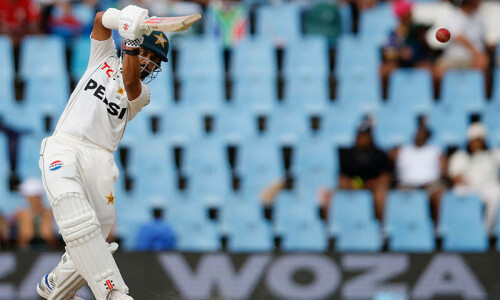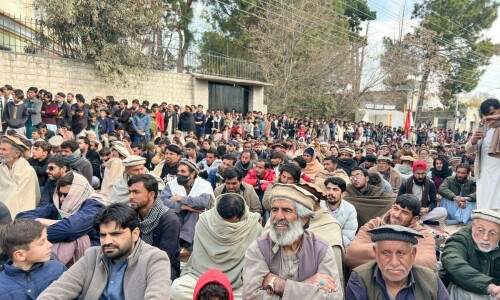“MAKING a woman the tribal sarbarah (elder/head) is a big challenge. The more people around me say women cannot do certain things or that women are not meant to lead, the more I want to prove them wrong,” says Heer Soho, a female politician from Sindh.
The past few days have been heady for Soho as word spread of her being ‘selected as the first female tribal chief in Pakistan’, something which she says is a matter of immense pride, but a great responsibility at the same time.
After Eid, she will formally become the chief of the Soho clan in a ceremony and might even get to wear the dastaar. “It could be an Ajrak, shawl or even a pagri,” she says.
A mild-mannered woman in her 40s, Soho beams with pride when she starts talking about her life and the most influential person who gave her a sense of direction.
“I was the first girl in my family to go to college and finish university. Had it not been for my father, Ismail Soho, this wouldn’t have been possible. A lot of girls in my family went for higher education after I finished my studies,” she recalls.
The eldest among her siblings — three sisters and a brother — Soho says she has been fearless all her life, thanks to her “enlightened father”.
“It was my late father’s decision that I head the Soho baradari,” she says, explaining how her clan is different from the tribes that dominate upper Sindh. “My father was called sardar by the people of our baradari out of love and respect. People looked up to him and he did whatever he could for their well-being,” says Soho.
Soho entered politics in early 2000s and was elected councillor in the 2001 local bodies elections. Since then, she has gone on to become an MPA four times on reserved seats. “Back then, the graduation clause was in place and the MQM was looking for educated women. My father had been a lifelong jiyala (PPP member), but when it came to entering politics, I opted for MQM and my father supported me.”
But later, she joined the Pakistan Peoples Party and has been an active member ever since.
“My next goal is to improve women’s lot in my area and thereby bring about change. Another aim is to hopefully get the party ticket on a general seat in the next elections. I am hopeful [PPP] chairman Bilawal Bhutto will give me this chance,” she says.
Asked if she faced any resistance after she was picked for her new role, Soho said she had seen little so far. “I had my father’s backing” as well as that of Hafiz Ghulam Muhammad Soho, an influential cleric in Sindh.
“My father had been grooming me the past few years for this role. I would observe how things were handled in the panchayat” Soho said. So far, she has resolved over a dozen cases in the local panchayat. The issues range from monetary dispute to pending investigation cases with police to domestic violence cases.
“Now my goal is to get more women join me. I want to make sure that more women become elders and form committees for the well-being of their communities,” she said
Soho feels the participation of women in all walks of life is unavoidable if a society is to change. “We need to give women a chance. Unlike upper Sindh, our area does not have the issue of Karo Kari. Things are more relaxed for women and you will see them running their own small businesses, managing farms and tending to livestock.
“There are so many challenges confronting the rural areas of Sindh. Without taking women into account, these can’t be sorted out,” Soho stresses while waiting for restoration of power supply at her house in Gulshan-i-Iqbal.
‘The men in my life’
Named Heer by her father, Soho says her name is from the Kalam (poetic works) of Shah Latif and means “a gust of cold wind”, clarifying that she was not named after the tragic heroine of Waris Shah’s Heer Ranjha.
“People say ‘behind every successful man there is a woman’. I have no qualms in saying behind every successful woman there are men. In my case, it was first my father and now my husband. They have given me space to succeed.”
Soho recalled that she met her husband during a party meeting in Sindh. “He was a zonal in charge of the MQM. He sent a proposal through my chacha (uncle) and my father asked for my opinion,” she says.
Counting the firsts in her life, Soho says: “I was the first girl in my family to go to university and do her masters. I was also the first woman to enter politics. Last but not the least, I was the first to do pasand ki shaadi (love marriage).”
In reply to a question about being a woman in the public eye and the expectations of her family and society, Soho — a mother of three — says after her father, her husband has been very supportive in all her endeavours. Often referring to him as a “fine, well-spoken person”, Soho says: “Had it not been for his support, I would not have been where I am now after shaadi (marriage).
“I sometimes come home at 3am after attending political events. Sometimes I am away from home. He trusts me and this motivates me.”
As far as society goes, she says that sometimes there is a barb to things people say. “Somehow men feel that women are there to hog the limelight. While some pass snarky remarks, others simply get uncomfortable in the presence of women at political events.”
“At times, men even say things like “aap ko koi kaam nahi hay ghar par?” (Have you nothing to do at home?). This is a comment many female politicians get to hear. The latest is “Acha tou ab aap sardar bun gayee hay” (I see! You’ve become a tribal chief now). Sometimes I ignore, at other times these comments can hurt you.But then again, I tell myself to focus on the work that I can do for society and don’t let myself get demotivated.
She acknowledges that being in the public eye means an end to private life. “I can’t post impromptu selfies with family now because I have to be seen in a certain way to be taken seriously. Your private life suffers.
“At times you end up neglecting family. If your husband isn’t supportive, things can get nasty. Women are always under observation and we have to learn to live with it.”
Her word of advice to girls and women is to keep pushing and striving for excellence. “You have to make an effort and create space for yourself.
“Anything that a man can do, a woman can do better. We can adapt ourselves to any situation. That’s how Allah has created the female kind.”
Published in Dawn, March 25th, 2022














































